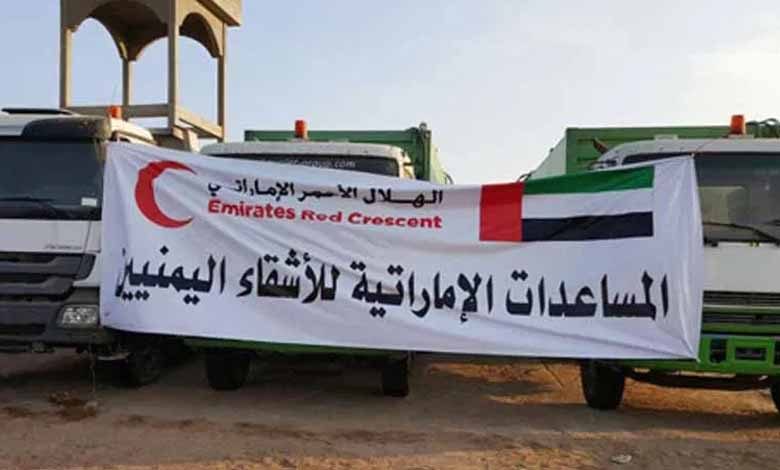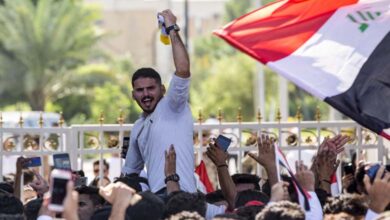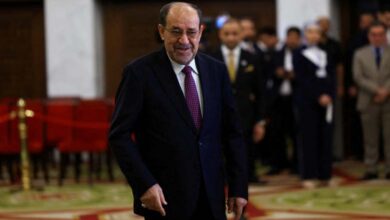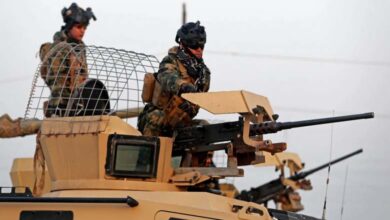The UAE the first to send aid to Yemen

The UAE’s aid to Yemen from April 2015 to December 2018 reached $6 billion, benefiting more than 17 million Yemenis, including 11 million children and 3.2 million women, the UAE’s official news agency WAM reported Friday.
The UAE’s assistance to Yemen comes in line with the challenge of restoring normal life to all areas of Yemen without exception, and has contributed significantly to eliminating the effects of systematic destruction caused by the Houthi militias. The assistance included support for public programs, health, education, power generation and supply, transportation and storage, support for the general budget, civil society and judicial and legal development, social services and emergency relief and food items.
The UAE is the largest donor, and the UAE is the world’s largest direct humanitarian aid donor to the Yemeni people in 2018. It is the second largest donor to the UN humanitarian plan in Yemen for the same year.
In 2018, UAE aid to Yemen amounted to about 7,838 billion dirhams ($2.13 billion), of which 1,840 billion dirhams ($500 million) were earmarked to support the 2018 UN Humanitarian Response Plan for Yemen.
In support of the budget, the UAE has allocated 8.80 billion dirhams ($2.40 billion) of this aid to support public programs. The UAE government has provided assistance to support the Yemeni general budget and pay salaries to government employees, in order to continue providing all government agencies with services that concern a broad sector of the population, especially in the areas of health, education, and security.
In the area of food and relief, the UAE has provided 3.84 billion dirhams ($1.05 billion) in aid, maintaining a high level of food distribution among the Yemeni population, which has reached more than 528 tons per day, in addition to distributing various relief items, including tents and special blankets, in areas where displaced people gather.
The UAE has allocated 1.72 billion dirhams ($467.9 million) to support the energy sector, which has borne the operational costs of generating electricity, providing electricity supply services, rebuilding and maintaining power plants, and providing fuel for power plants and generators, in order to produce the energy needed to operate hospitals, schools, and public buildings across Yemen.
Construction and maintenance of 17 750 megawatt power plants have been completed, and a 368 million dirham ($100 million) power plant is being developed and implemented in Aden to fill the power supply shortfall. A total of 368 million dirhams ($100 million) has been allocated in Hadramaut province to support and rehabilitate 294.4 million power plants ($80 million).
The UAE has provided 845 million dirhams ($230 million) of its aid to support the health sector and alleviate the shortage in health services, medicines and medical supplies.
The UAE has contributed to the rehabilitation and maintenance of 55 hospitals and health centers in a number of Yemeni areas, provided 75 ambulances, and implemented campaigns to immunize 488,000 children against polio and measles.
To preserve the future of the Yemeni people, the UAE has provided generous assistance to the education sector, amounting to 153.9 million dirhams ($41.9 million), through which it funded projects to build and rehabilitate 230 schools and provide 70 buses for school transport. Transport and storage received 575 million dirhams ($156.5 million), while 515 million dirhams ($140.5 million) were allocated to support social services.
The UAE’s assistance to Yemen helped rehabilitate basic infrastructure such as airports in Aden, Al-Rayan and Socotra, as well as sea ports in Aden, Mukalla and Socotra.
The UAE implemented 10 water plants and networks with 80 pumps, four sewage treatment plants, 250 wells and a dam for storing clean water, and more than 500 police vehicles to support security institutions, and rehabilitated 38 police stations.
In financing the UN plans, UAE aid has played an active role in implementing UN efforts and relief plans in Yemen. Most of the aid is provided in northern provinces such as Sanaa, Taiz, al-Hodeidah and other northern areas based on the plans and priorities of UN organizations.
The UAE and Saudi Arabia launched a $500 million “supply program” to fight hunger in Yemen, as well as additional support to help meet urgent humanitarian needs in the food and nutrition sectors.
With a focus on addressing acute malnutrition among children under five, pregnant and lactating women, through the United Nations and international, regional and local organizations. The UAE has so far paid $50 million to a 10-12 million supply program to provide food supplies consisting of five basic items, most notably wheat, for a period of up to four months.
The UAE and Saudi Arabia also donated $70 million to support Yemeni teachers through UNICEF. The UAE’s share of this assistance, valued at $35 million, will pay 135,000 teachers for 10 months.
The UAE, in collaboration with the US Agency for International Development (USAID), contributed 18,400 dirhams ($5 million) to the school feeding program “Food for the Idea” in Yemen, which was implemented by the World Food Program.
Al-Hodeidah’s support The amount of UAE aid to al-Hodeidah province from June 20 to December 6, 2018 was 1.183 billion dirhams ($321.5 million).
Al-Hodeidah province is the second most heavily-received UAE support for the UN Humanitarian Response Plan for Yemen in 2018, worth $43.2 million.
The UAE has delivered more than 110,000 food baskets to 55 districts in al-Hodeidah province, benefiting more than 770,000 people. It has also helped supply water by building 23 water stations in al-Hodeidah and water tanks.
They built a series of bakeries, and they launched the first four bakeries in al-Khokha district in al-Hodeidah province to provide free bread for residents.
Mobile clinics have been established in a number of regions to provide treatment and health care in a number of disciplines, including respiratory diseases, high blood pressure, acute malnutrition, dengue fever and care for pregnant women.
The UAE renovated fishing ports in order to restore normal life in the liberated areas, and the first port was opened in the directorate of Al-Khokha.
In preparation for the school season, the UAE has provided support to 14 schools on the west coast, which have been supplied with educational materials and solar panels.












